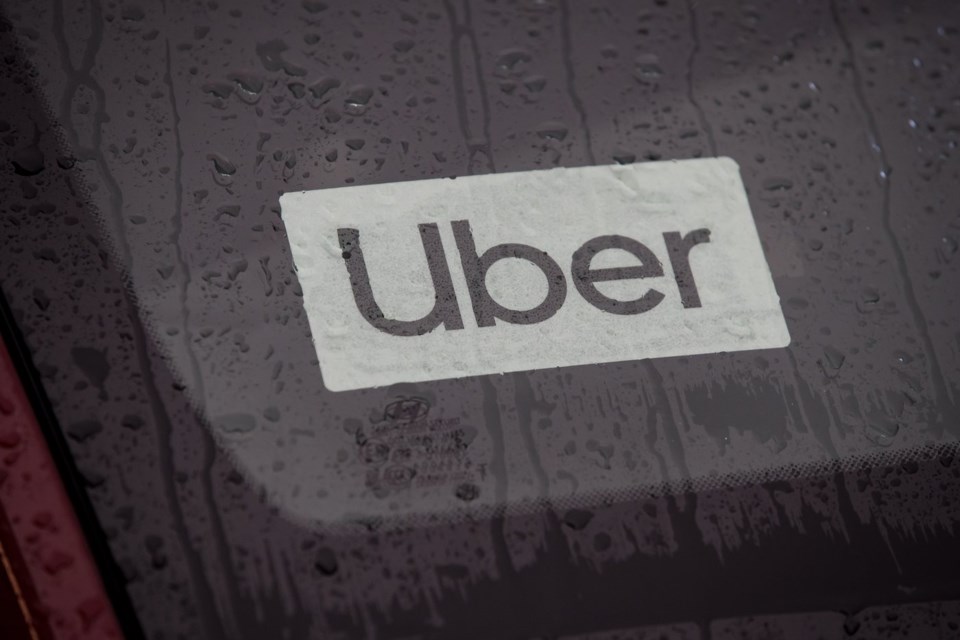VANCOUVER — Uber says regulation changes for ride-share and delivery workers in British Columbia will drive up costs and reduce demands for local restaurants, but Premier David Eby says complaining companies can "suck it up."
Uber issued a statement Thursday saying it supports some of the new rules coming in September, such as an increased minimum wage and health and safety coverage, but the amount it is being forced to pay workers for using a personal vehicle is "unreasonable."
The president of a group representing Canadian gig workers said she's disappointed with some of the changes, while Unifor, the country's largest private-sector union, said B.C.'s regulations lead the way to enshrine the basic rights of gig workers.
The Ministry of Labour announced this week the first-in-Canada regulations will take effect on Sept. 3, including setting a minimum hourly wage for the time workers are engaged on the job at $20.88.
The rules also ensure 100 per cent of customers' tips go to the worker, that they are covered through B.C.'s workers' compensation agency and that they receive a 35- to 45-cent per-kilometre vehicle allowance.
Uber's statement said the changes would make the ride-share expense rate in B.C. 50 per cent higher than the comparable rate in California.
The company said it encourages "the government to reconsider the consequences for British Columbians who rely on ride-share and delivery."
Eby said at an unrelated news conference that companies can complain about the regulations, but they will not change.
"These companies can suck it up, they'll be alright, they'll be fine," he said.
Eby said British Columbians will use the service that is most cost competitive.
"And that may be any of those companies, or it may be some entirely different company that starts up in this province.”
The premier said he sometimes uses apps to get food delivered.
“There is no chance that I want my food brought to me by someone who has to use a food bank, or who, if they get attacked at work, isn't covered by WorkSafeBC,” he said, referring to the provincial worker-safety agency.
Eby said he doesn't want to see someone going further into debt because they have a car to pay for that isn't supported by their employer, "which are these app-based companies that have billions of dollars in revenue.”
Unifor western regional director Gavin McGarrigle said in a statement that gig workers are some of the most exploited and under-represented workers in B.C.'s economy.
Jennifer Scott, president of the Toronto-based group Gig Workers United, said while some of the changes could be beneficial, she's concerned about a minimum wage being set only for time when workers are engaged on a call.
Scott, who has worked for multiple apps using her bicycle since 2017, said delivery workers spend a significant amount of time not on a specific call.
"If a government brings in regulation that allows us to pay workers minimum wage only for engaged time, you're effectively changing what minimum wage means," she said.
Scott said minimum wage is meant to be the lowest amount of money an employer can pay someone for the entire time they're at work. She said it's an employer's responsibility to make sure there's enough to be done.
"This regulation tells that employer that they can choose how much of the time workers spend at work is time that they have to pay for, and that they can allocate a certain amount of work time and time that doesn't need to be compensated."
Scott said she appreciates the health and safety protections that are coming with the new regulations, but gig workers still don't have many other safeguards found in conventional work.
What processes exist that they can use to speak about an unfair termination, or wage theft, or discrimination, she asked.
"Without the correct classification as a worker, workers don't have those paths to resolve the issues and the problems that they experience in the workplace with their employer. And that's where our concern is."
Unifor said gig workers also deserve unique legal tools to form their own unions.
They say unionizing can be a struggle because of the lack of transparency around these types of companies' total local workforce.
Union votes are triggered in B.C. after 45 per cent of a certifiable group signs a union card.
"However, without accurate knowledge of the threshold, the organizing efforts are more likely to fail or stall. Unifor has lobbied for employers to be forced to provide a payroll list after 20 per cent of workers sign union cards," the union said.
This report by The Canadian Press was first published June 13, 2024.
Ashley Joannou, The Canadian Press



